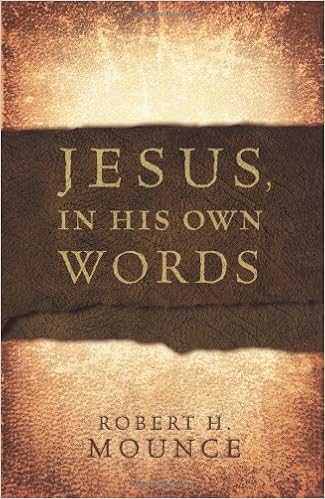Today I’m posting my interview with renowned New Testament scholar Robert Mounce.
Mounce has been part of the scholarly teams that translated various Bibles, including the New Living Translation, the English Standard Version, and the New International Version.
Robert Mounce is also the author of the incredible Jesus, In His Own Words – one of the best translations of the Gospels I’ve ever read. This amazing book weaves the four Gospels together without losing a verse, puts the whole Jesus story in chronological order, and tells the story in Jesus’ own words.
A monumental work.
Here’s my interview with Robert Mounce. Enjoy!

Frank Viola: Robert, tell us about your education, teaching history, and your work as a New Testament translator.
Robert Mounce: Undergraduate work was at the University of Washington. I have 2 masters degrees from Fuller Theological Seminary, a PhD from the University of Aberdeen in Scotland, and post doctoral work in archaeology from New York University. My first taste of translation was in a book called the New Testament from 26 Translations.
Subsequently I was on the original committee for the NIV, was involved with the NLT, also the NIrV, but primarily with the ESV as assistant New Testament editor. I translated the New Testament for our interlinear and that translation is now a standalone.
I translated the gospel of John with the apostle as narrator, the 4 Gospels as one narrative with Jesus as the narrator (Jesus in his Own Words), and currently I am translating Mark with Peter as narrator.
There is nothing in the scholarly field more rewarding, that I know of, then translating God’s word. I taught for 9 years at Bethel College, 3 years at Western Kentucky University before becoming academic Dean. I finished my career as president of Whitworth University.
Frank Viola: Your book, Jesus, In His Own Words, is an amazing work. I use it frequently. For readers who aren’t familiar with it, share with us what it is and how it’s different from other Bibles.
Robert Mounce: Jesus, in His Own Words is a harmony of the 4 Gospels written in fairly contemporary language and employing Jesus as narrator. I have found that this communicates the gospel story as vividly as possible.
Someone said, “easy reading is damn hard writing.” I work for clarity as well as accuracy. No one should have to come up with the mental energy in reading that should have been expended in the writing. A harmony of the Gospels provides the entire picture at one time.
Frank Viola: I completely agree. The book is phenomenal. What inspired the idea to create this particular book? And who is the primary audience?
Robert Mounce: I had already published The Story of Jesus, a translation of the Gospel of John using the disciple as the narrator. The idea was to provide the nonbeliever or the new Christian with this gospel in language they could grasp and in a way that would hold their attention. It has served that purpose well. It will be out soon as a free e-book.
Frank Viola: While writing it, what sorts of things struck you the most? That is, what insights impacted you in particular while looking at the Lord’s earthly life in chronological order and told in the first person?
Robert Mounce: Perhaps it’s my background, but what struck me as especially interesting is the rather distinct approach of each Gospel writer. I’m not speaking primarily of variations in wording but rather the entire approach. To tie these together in a coherent fashion results in a larger comprehensive grasp of the gospel stories.
I noticed very early on in that the gospel writers told the story as simply as possible. It seems as though the characters always simply “say” rather than affirm, declare, suggest, answer, shout, remonstrate, etc. The interpreter’s task is to recreate the setting and choose the right words to communicate not simply what is said but how it is said.
Frank Viola: If someone were to ask you, “I’m a Christian who reads my Bible regularly. Why would I want to read your book? What benefit would I have in doing so?” How would you respond?
Robert Mounce: I believe a regular Bible reader will benefit from my book because they will be exposed to a comprehensive understanding of the gospel narrative. They will come away with a more balanced and accurate understanding of each pericope.
Frank Viola: What has been the general response to the book from readers so far?
Robert Mounce: The book has been well received, although when one who has written almost entirely for the scholarly world moves to another audience they face a challenge of competing with the evangelical household names, Max Lucado for instance.
Since studies show that such things as cover design, title, how well known the author is, are the major factors in sales, it is tough for anyone unknown to that public to write something that will go viral
Frank Viola. Well, I hope interviews like this one will help. I think every Christian should own a copy of the book. What is your thought on issuing a revised version with maps, locations, and probable dates . . . so the reader can see where Jesus is when He’s speaking and where in the chronology various events took place?
Robert Mounce: I would like to see a revised version of the book with maps and locations but at 90 years of age I would rather spend my energies translating.
Someone in the publishing business could find those who would do that. That would be fine with me.
Frank Viola: I hope someone rises to the occasion. Maybe your son William who is also a Greek scholar will (hint, William). What other projects are you working on now?
Robert Mounce: As I mentioned above, I am doing another translation, this time of the Gospel of Mark, which allows Peter to tell the story. After all, that’s where Mark got his information.
I am especially interested in including as much cultural background as possible. Let me put the approach in as few words as possible. E.g., In the story of the woman healed of a flow of blood, the language tends to suggest that Jesus’ words indicate not only that she was healed physically but now that her uncleanness was over she could rejoin society.
That’s why she was moving away and turned again to Jesus falling at his feet. Ritually unclean women simply do not touch the robe of another but she was so desirous of being healed that she did an almost unthinkable thing. Something of that should work its way into a translation. Check Francis in NIGTC.
Update: Robert passed away in January 2019 at the age of 97. I’m glad I got to talk to him before he left us.
Related:
My Review of Jesus, In His Own Words



Frank, thanks for making me aware of this author and his book.
Ordered it today at Amazon and looking forward to its arrival.
I’d love to own Jesus, In His Own Words in Kindle format.
Are there plans to publish a Kindle edition?
I wouldn’t know. You can contact the publisher and ask.
I just ordered this book on Amazon.ca . . . looking forward to reading it.
I was about to ask if he was related to Bill Mounce (author of the mandatory seminary textbook “Basics of Biblical Greek Grammar”) but you answered my question 🙂
I also bought his book on your recommendation and appreciate it a lot.
Frank, Thank you for this interview. I had the privilege of taking classes under Dr Mounce during my undergraduate studies at Western Kentucky University. I read Dr. Mounce’s book several weeks ago. I agree, this book is a tremendous contribution to understanding what Jesus really said in the context of the world in which Jesus lived. Thank you for sharing this interview with us!
Awesome. I bought this book last year because of your recommendation, Frank, and I thoroughly enjoyed it. Thanks for the interview.